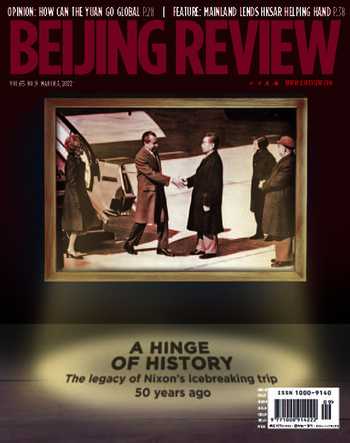Underlining the Fundamentals
In February 1972, then U.S. President Richard Nixon paid a visit to China. Considered an icebreaking trip in SinoAmerican relations, both sides issued the Shanghai Communiqué, marking the end to 22 years of alienation between the two countries and the beginning of a normalization of bilateral relations. Today, China-U.S. relations usher in the visit’s 50th anniversary amid tensions.
Looking back on 50 years of exchanges and looking ahead to the future development of the China-U.S. relationship, we must highlight several points so that both countries can gain a clear, mutual understanding and ensure the sound development of their bilateral ties.
The normalization of relations between the U.S. and China catered to the needs of the times for both sides. The Cold War between the U.S. and the Soviet Union was in full swing, so Nixon decided to contact China to seek the Soviet Union’s isolation—serving American national interests. At the same time, Sino-Soviet relations were also strained, requiring China to improve its relationship with the U.S.
Sino-American relations should be equal and mutually beneficial. Currently, American politicians either criticize or sanction China for not conforming to the American will, an attitude unacceptable to the Chinese side.
China-U.S. exchanges over the past half-century have demonstrated that cooperation will profit both, whereas confrontation will harm both. The trade disputes between the two in recent years have once again verified this. The current U.S. inflation partially stems from the damaged bilateral trade.
The two sides need to respect and understand each other now more than ever. Both China and the U.S. should take note from history when it comes to the power of cooperation.
Sino-American relations are not a matter of China and the U.S., but a matter of international affairs.
In the post-pandemic era, the world will face new changes and challenges, but great-power competition should not be today’s global theme, nor will it solve America’s problems. China and the U.S. should act in the fundamental interests of their two peoples, follow the trend of worldwide development and progress their bilateral relations based on the principles of mutual respect, peaceful coexistence and cooperation. BR
3874500338241

